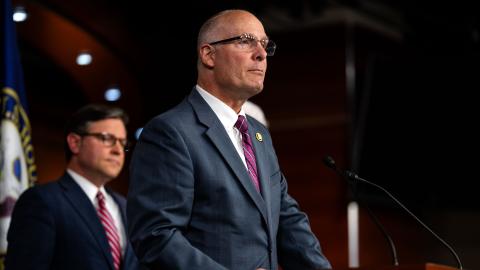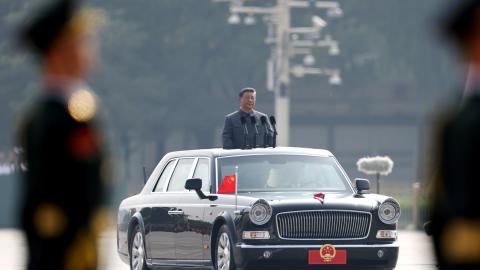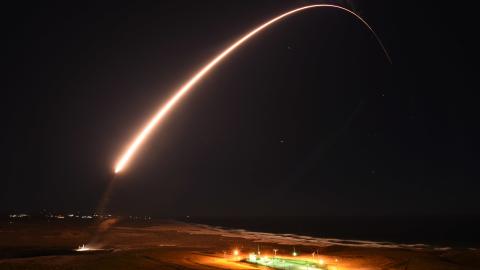Historically, Americans have been less susceptible than Europeans to antisemitism. But since October 7, 2023, American Jews have found themselves squarely in the crosshairs of the political left and the political right. Assigned a symbolic role by both fringes, American Jews are caught in the cross fire as progressive internationalists and extreme isolationists battle each other for control of the traditional middle of the country.
On the left, antisemitism takes the form of anti-Zionism. Its emblem is the “tentifadas” on elite campuses. Universities that style themselves champions of diversity now host chants for Israel’s eradication. Encampments celebrating Hamas set the moral tone. When mobs target Jewish students, administrators avert their eyes and invoke “free speech.” Yet the same administrators spring into action when non-Jewish groups suffer even a “microaggression.” The very institutions charged with cultivating civic responsibility have become engines of intimidation. Jewish students are harassed, excluded from clubs, and pressured to renounce Israel for acceptance into the “community.”
On the right, the emblem is Tucker Carlson. He has updated the Protocols of the Elders of Zion for the 21st century. With his platform he promotes a view of modern history in which “the Elders” manipulate every major turning point. He elevated the podcaster Darryl Cooper to “the best and most honest popular historian in the United States.” Cooper trivializes the Holocaust as a bureaucratic mishap and depicts Winston Churchill not as a defender of liberty but as the agent of rich Jews. Churchill—not Hitler—becomes the villain, dragging America into war. World War II ceases to be a triumph of good over evil; it becomes the first in a series of misguided American interventions abroad—engineered, ultimately, by Jews.
Carlson’s program has entertained claims that Israeli intelligence had foreknowledge of 9/11 and suggested that Israel turned al-Qaeda’s attack into a lever to drag America into Iraq for its own purposes. At Charlie Kirk’s memorial, he pushed further. Carlson likened Kirk’s death to the crucifixion of Jesus—both truth-tellers, he said, killed because their message threatened the rich and powerful. He pictured the men who killed Jesus meeting “in a lamp-lit room . . . eating hummus.”
Israel is more than a thorny policy question; it has always carried a special symbolic weight in America.
The choice of food was not random. Traditional antisemitism charges Jews collectively and permanently with the killing of Christ: deicide. Carlson revived that charge, but with a twist. By describing the killers as “hummus eaters,” he identified them as Jews, not Romans—and, at the same time, as Israelis. He directed the oldest and most destructive accusation against the Jews with special force at the Jewish state.
Why are Americans suddenly attacking Jews from left and right simultaneously? The cross fire grows out of a larger debate about America’s role in the world. The alliance structures and global commitments built for the Cold War sit uneasily alongside the rise of China as a peer competitor. Two decades of Middle Eastern wars—from Iraq to Afghanistan and Syria—have made Americans question the costs of staying engaged.
Should America remain the preeminent power in all areas of the globe? Or should it withdraw from the Middle East and, possibly, from Europe too? Or should it retreat entirely, pull up the drawbridges, and focus inward?
In practical terms, a pullback from the Middle East would mean reconfiguring relations with Israel—always a controversial and emotional subject in American politics. But something deeper is also at work. Israel is more than a thorny policy question; it has always carried a special symbolic weight in America. There is the practical debate over strategy, costly commitments, and alliance management. And then there is the larger question of meaning: what America is, and what role Israel plays in its story.
From the beginning, Americans cast their self-understanding in Israel’s image. This identification long predates the Republic. In 1630, as Puritan leader John Winthrop and his followers prepared to sail on the Arbella, preacher John Cotton assured them: “What [God] hath been to his Israel of old, that he will be to New England. [W]hen God intends a favour to a people, he will make his Covenant with them, as he did to Abraham.”
In crossing the Atlantic, the Puritans saw themselves as Israelites crossing the Red Sea. They mapped the Holy Land onto the wilderness—Bethel, Salem, Zion, Mount Ephraim. Massachusetts Bay was the New Jerusalem rising from European corruption.
The identification endured—in some ways even down to today. Nearly a century and a half later, in 1776, Congress asked Benjamin Franklin, Thomas Jefferson, and John Adams to design a national seal for the new republic. Franklin’s proposal was not adopted, but it is worth pausing over what he suggested. He turned to the Hebrew Bible. In his own words, the seal should depict “Moses standing on the shore, and extending his hand over the sea, thereby causing the same to overwhelm Pharaoh, who is sitting in an open chariot, a crown on his head and a sword in his hand.” His proposed motto was equally explicit: “Rebellion to tyrants is obedience to God.”
The message could not have been clearer. Britain was Pharaoh; Americans were Israelites, experiencing Israel’s deliverance in their own history. Franklin’s design shows how deeply Cotton’s covenantal vision still resonated at the time of the founding.
The Massachusetts Bay Colony was America in embryo. Twinned to Israel in the womb, the United States to this day does not know where America ends and Israel begins. When Americans talk about Israel, they are often talking about themselves.
From the beginning, Americans cast their self-understanding in Israel’s image. This identification long predates the Republic.
Mark Twain saw it with comic clarity in The Innocents Abroad (1869). His fellow travelers arrived in Palestine with verdicts already prepared. Presbyterians found a Presbyterian Palestine, Baptists a Baptist one, Methodists a Methodist one. “They could no more write dispassionately and impartially about it,” Twain quipped, “than they could about their own wives.”
The habit of looking at the Holy Land and seeing America reflected back has never died. Evangelicals still see in Israel a covenantal twin: God’s promises to Abraham endure alongside the covenant with Christians. But even secular Americans often feel a similar attachment. My own mother—an ardent atheist who detested evangelical Christianity—loved Israel, a country she had never visited. Indeed, she had little interest in the world beyond our borders and virtually no experience of it. She acquired her first passport at 64, solely to attend my wedding in London. Yet she regarded Israel as America’s little sister. She considered Prime Minister Benjamin Netanyahu not as a foreigner manipulating America but as a wise leader worth listening to. Had I told her that her views sprang from the same well from which the evangelicals drank, she would have been incredulous.
This widespread sense of kinship—religious or secular—poses a challenge to the two ideological fantasies now shaping America’s foreign policy debate.
On the left stands transnational progressivism, the political faith of elite universities and the Democratic Party’s progressive wing. Its vision is not confined to America itself. It dreams of governing the world through an enlightened managerial elite. In place of national sovereignty, it prizes international institutions, global rules, and a vanguard of technocrats who see themselves as guardians of progress. It borrows from Leninism the idea of a vanguard party but replaces class struggle with identity politics. Its mission is not to represent America but to fundamentally transform it—and, in the process, to transform the world.
Its lens is race and identity. The 1619 Project casts America as founded in slavery, stained irredeemably by white supremacy. Diversity, equity, and inclusion bureaucracies enforce this creed, turning every issue into a morality play of oppressed versus oppressor. Progressives give more attention to Israel than to any other foreign nation, casting Israelis as “white colonizers” and Palestinians as “oppressed peoples.” Zionism becomes not a nationalist movement like any other but a uniquely nefarious form of settler colonialism.
The Massachusetts Bay Colony was America in embryo. Twinned to Israel in the womb, the United States to this day does not know where America ends and Israel begins. When Americans talk about Israel, they are often talking about themselves.
At this point, political preference shades into rank antisemitism. Progressivism opens its arms to Jews only if they renounce Zionism, treated as synonymous with racism. On campus, Jewish students are pressed to declare themselves “safe” allies by disowning Israel. Professors, administrators, and activists police Jewish belonging, delineating “good Jews” from “racists” and “colonialists.” The ideology that parades as a champion of inclusion demands Jews amputate the very core of their peoplehood to belong.
Israel is intolerable to transnational progressives because it threatens them on two fronts: politics and cosmology. Politically, if progressivism were to recognize Holocaust-surviving Jews as legitimate victims of oppression, then Jewish leaders in America—successful by every economic measure—could also claim authority to speak for the oppressed. That would challenge the monopoly progressivism claims over the right to define victimhood, the very source of the vanguard’s legitimacy.
But the problem runs deeper: Israel is not a “white” society. Its Jewish population includes, among others, Yemenite and Ethiopian communities—unmistakably people of color by contemporary progressive litmus tests. Their very presence highlights the absurdity of the racial binary on which the progressive coalition depends.
Cosmologically, Israel is the archetypal nation-state: God, people, land. Covenant and borders. Its claim to particularism activates what Abraham Lincoln referred to, in another context, as America’s “mystic chords of memory”—the emotional and historical ties that connect diverse Americans as a single people. Zionism awakens the buried memory of America’s own covenantal particularism. American exceptionalism is the secular descendant of Cotton’s Arbella sermon.
Israel’s miraculous rebirth, and its power and flourishing—despite the destruction of European Jewry, and its multiple wars for survival—stir American nationalism. The very existence of the Jewish state and the excitement it provokes in America shatters the progressive dream of a post-national, multicultural world run by a global managerial elite. For that reason, progressives must sever the American bond with Israel. As long as Americans and Israelis see each other as members of a family with a unique destiny, the progressive project can never be complete.
The antisemitism of left and right is not a noxious gas seeping out of the soil and wafting into politics. It is being weaponized—cleverly and deliberately—by organized forces for political warfare.
From the other pole, Carlson does not deny America’s uniqueness, yet he too seeks to sever the connection between American exceptionalism and Israel. His antisemitism is the timeless variety—straight from the Protocols. He spins conspiracies with modern props: Churchill as con man, 9/11 as an Israeli plot, the Iraq war as fought for Israel with American blood and treasure. In every case, powerful Jewish puppeteers pull the strings of American leaders from the shadows.
Carlson has put his antisemitism in the service of a right-wing fantasy future, a direct counter to the progressive fantasy. While progressives dream of a world unified under a transnational enlightened elite, Carlson and his followers dream of disengaging from the world. They see transnationalism as the enemy of American democracy. For them, the postwar American-led international order provides not security but suffocation. The American empire that rose up during World War II smothered the Republic. They imagine America retreating behind the Atlantic and the Pacific, treating them as moats, and living in a fortress. By putting a Jewish face on transnationalism, Carlson personifies the concentrations of unelected and unaccountable power that he says are crushing the popular will of American voters.
But this is more than just branding. Carlson is fighting inside MAGA for leadership of the future Republican Party. He seeks to pull it away from Donald Trump’s muscular nationalism toward purer isolationism. His problem is simple: The MAGA coalition is thick with evangelicals and secular nationalists whose kinship with Israel runs deep. That bond pulls America back across the oceans, into the Middle East from which Carlson dreams of retreating.
To achieve his vision, the bond must be severed. In recent months, Carlson and like-minded commentators have repeatedly cast Israel as a persecutor of Christians, including in Gaza.
Anyone who knows the modern history of the Middle East knows that this claim is total nonsense. Israel is the only country in which Christians are thriving, but the truth is irrelevant to Carlson. He is putting forward this lie in order to manufacture ideological counterclaims to the evangelicals, who assert that Christianity requires a special commitment to Israel.
In his crusade to shape MAGA’s isolationist future, Carlson has launched a campaign to define Charlie Kirk’s legacy. While stopping short of claiming that Jews killed Kirk, he alleged that pro-Israel donors “tormented” him in his final days—casting Kirk as a martyr broken for daring to question the Gaza war and Netanyahu’s leadership. In Carlson’s revisionist gospel, Kirk becomes a tortured saint in the church of America First, martyred by a vengeful elite just as he was turning against Israel. The stakes are immense: Kirk commanded a vast following, and the struggle for MAGA’s soul is also a struggle for those loyalists. Yet the record tells a very different story. Kirk’s final letter to Netanyahu brimmed with affection for Israel and the Jewish people, faulting only the combative tactics of some allies and insisting that the surest antidote to anti-Israel fervor lay in vigorous, open debate.
The antisemitism of left and right is not a noxious gas seeping out of the soil and wafting into politics. It is being weaponized—cleverly and deliberately—by organized forces for political warfare. Progressives festoon their bigotry with banners of diversity, equity, and inclusion, demanding Jews disown Israel. Meanwhile, Carlson updates the Protocols to paint Jews as the hidden hand behind the empire, insisting the covenant be cut so American patriots can smash unelected concentrations of global power.
Despite the hostility between transnational progressives and Carlson’s brand of conservative populism, both camps favor accommodation with Iran, about which they make almost identical arguments. By casting rapprochement with Tehran as both necessary and attainable, they recast Israel as the source of America’s troubles. For progressives, Israel blocks harmony among nations; for Carlson, it ensnares America in needless wars.
On the surface, Carlson and progressives appear to be firing at each other. In reality, their cross fire converges on the same target: the bond between America and Israel. That bond, stretching back through the founders to the Puritans, has shaped the Republic’s mission and united evangelicals with secular nationalists. To sever it is not simply to change foreign policy; it is to rewrite the American story.
President Trump is the inconvenient fact for both sides. He rejects the fantasy of a global managerial empire and the fantasy of fortress America alike. When Carlson opposed America’s participation in Israel’s strike on Iran, Trump brushed him off as “kooky” and pressed ahead—signaling that he will not let isolationists dictate his Middle East policy. Yet Carlson remains a uniquely influential voice in the MAGA world, and the administration has shown no signs of distancing itself from him over his antisemitism. Trump befriends Netanyahu even as he tolerates Carlson, embodying the contradictions of a movement where muscular nationalism and isolationist suspicion of Israel coexist uneasily under the same roof.
By occupying the messy middle, Trump reflects where most Americans also live. Their nationalism is pragmatic rather than utopian: America, they understand, cannot withdraw from the world, but neither should it dream of ruling it. That tension underscores the larger truth: Arguments about Israel are, at bottom, arguments about America. From the Puritans onward, Americans have cast their story in Israel’s image. To be for or against Israel is to choose among competing visions of the American future. When Trump embraces Netanyahu while waving off Carlson, he is not just setting Middle East policy—he is declaring who America is. For when Americans talk about Israel, they are talking about themselves: twin nations that gestated in the same womb, bound by covenant and destiny.


















